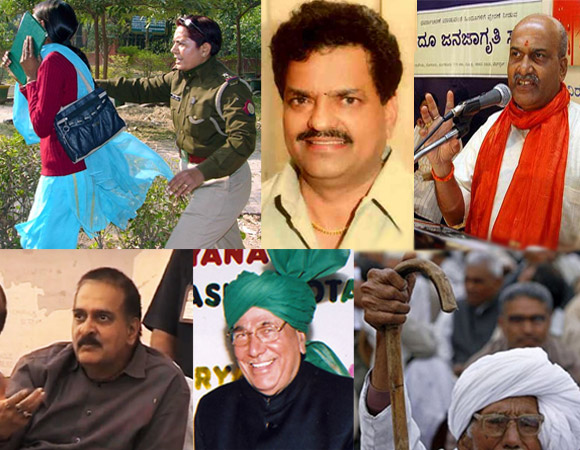
Chowmein causes rape.
Young women shouldn't be allowed to own cellphones.
Valentine's Day is immoral.
We bring you the individuals behind these outrageous statements targeting India's Youth -- vote and tell us who YOU think is the worst offender.
Earlier this month, Rajpal Singh Saini, the Bahujan Samaj Party MP from Muzaffarnagar, Uttar Pradesh, told a public meeting that giving mobile phones to women and children, particularly girls, 'only invites trouble'.
Saini is the latest representative from India's Moral Brigade trying to impose bizarre ideas on Young India.
From police officers blaming women wearing 'flimsy and fashionable' dresses for molestation, to khap panchayat leaders accusing the unassuming Chowmein for the rise in rape cases; from a village panchayat banning love marriages to cops beating up couples in parks; India's Moral Brigade has done everything it possibly can to antagonise Gen Y and ensure that 'corrupt Western practices' don't 'spoil character'.
In the pages that follow, we look at the people behind some of the most outrageous statements made and illogical actions taken against the young and the restless.
We want you to take this poll and let us know who you think is the worst offender against India's Youth.
Please click NEXT to continue reading...
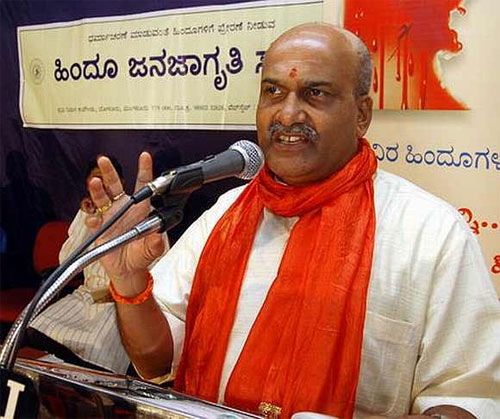
In blatant hooliganism in January 2009, a then little-known organisation, the Shri Ram Sene, attacked young girls partying at a popular pub in Mangalore, Karnataka, on the pretext that they were 'violating Indian values'.
SRS leader Pramod Muthalik justified the violence, saying the Sene was trying to protect women from 'immoral activities'.
Pravin Valke, founding SRS member, justifying the attack, questioned why girls should visit pubs at all.
'Are they going to serve their future husbands alcohol?' he was quoted by the Indian Express as saying. 'Bars and pubs should be for men only. We wanted to ensure that all women in Mangalore are home by 7 pm.'
B S Yeddyurappa, then the chief minister of Karnataka, said stringent action would be taken against the SRS, but ruled out the possibility of banning the organisation.
The Sene was at the receiving end of an indignant backlash from across the nation. Only a month later, on the occasion of Valentine's Day, Muthalik was given a mocking, widely-publicised response for his chauvinistic outlook by 2,000 Indian women.
Of all the occasions India has imported from the West over the years, February 14 has likely caused the most trouble.
So when the Sri Ram Sene, encouraged perhaps by the publicity it received after the pub attack in January 2009, stepped up its campaign against 'Western practices' by announcing that any couples spotted celebrating Valentine's Day would be forcibly married off immediately, it was hardly surprising.
This was not the first time right-wingers raised objections against V-Day -- the Shiv Sena has caused disruptions in Mumbai and other cities in Maharashtra on February 14 for years, threatening and damaging shops that run romantic promotions and destroying property -- but in the Sene's case, it evoked an unanticipated reaction.
Nisha Susan, a New Delhi-based writer-journalist, initiated the Pink Chaddi Campaign as a response to Muthalik's bullying stand, in which she encouraged women from across the country to send a pair of panties to the Sri Ram Sene headquarters as a mark of protest.
In the weeks leading to Valentine's Day of 2009, an estimated 2,000 packets containing Chaddis found their way to the SRS.
Outraged by the barrage of lingerie, Muthalik threatened to sue the campaign activists and as tensions grew, he and other SRS members were held on the eve of Valentine's Day that year.
Since then, both the Shiv Sena -- which now has Aditya Thackeray, who was educated at Mumbai's prestigious St Xavier's colleage, as head of its youth unit -- and the Sri Ram Sene have softened its stand on the issue.
Please move on to the next slide and register your vote on the last page of this slide show.
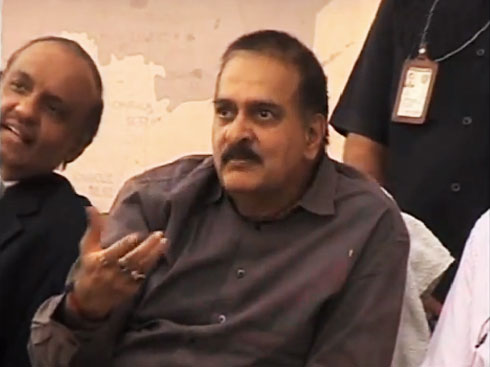
This gem came from V Dinesh Reddy, Andhra Pradesh's then director general of police, in December 2011, when he was asked why the state police had failed to halt the rising number of rapes and murders.
Reddy said the police had no control over rape and squarely blamed women who dress provocatively, wearing 'flimsy and fashionable' dresses.
At the time of his response, his state had a reported 1,291 rape cases, as against 1,228 during the previous year and 1,147 the year before, in 2009.
His statement: 'Now, wealth has increased, corporate styles have seeped into the villages, bringing in liquor and other cosmopolitan cultures. These modern women are more vulnerable to rapes.'
Not to be outdone, a couple of days after Reddy's statement, Karnataka's then minister of women and child welfare, C C Patil decided to offer his views: 'I personally don't favour women wearing provocative clothes and always feel they need to be dignified in whatever they wear.'
Then came the final straw, this time from a woman -- K K Seethamma, head of a committee set up by Bangalore University to fight sexual harassment, who suggested that wearing revealing clothes tempts men and results in rape.
'Even when one wears saris, long-sleeve blouses must be worn. I tell my students they must wear long kurtas when they wear jeans... Many women lecturers in BU wear salwars and jeans, too. What respect can they expect from boys? Only a sari with long-sleeved blouses invokes respect for women teachers, nothing else,' Seethamma declared.
Please move on to the next slide and register your vote on the last page of this slide show.

What constitutes decent dressing in college has been a topic of much debate and discussion since about three-and-a-half minutes after the first Indian woman stepped onto a campus.
And for some reason that we can't quite fathom, it remains so.
The most recent example of this was a threat issued in August by the Jharkhand Mukti Sangh. The JMS plastered large, handwritten posters in bold red along the main thoroughfares of Ranchi, threatening acid attacks on women wearing jeans and tee-shirts and seen without dupattas.
And how did Jharkhand's women and child development minister Vimla Pradhan choose to react? She advised college girls to cover up!
'Girls should avoid wearing vulgar dresses,' Pradhan said. 'Parents have a role to play. They should exercise discretion in wearing dresses.'
Indeed, the Moral Brigade has tried to impose a dress code on Indian women time and time again.
In June 2009: Four leading women's colleges in Kanpur, Uttar Pradesh, prohibited students from wearing jeans, fitting clothes, sleeveless blouses and high heels.
In June 2010: The Krishna Menon College in Mumbai, Maharashtra, denied admission to female students who were wearing jeans that were 'too tight' for the college's reputation.
In December 2010: A local government college in Bhopal, Madhya Pradesh, prohibited its female teachers from wearing jeans and insisted they wear saris on campus.
In January 2011: A khap panchayat in Muzaffarnagar, Uttar Pradesh, banned girls from wearing jeans, since wearing jeans would provoke eve-teasing and encourage -- hold your breath -- young couples to elope.
Please move on to the next slide and register your vote on the last page of this slide show.
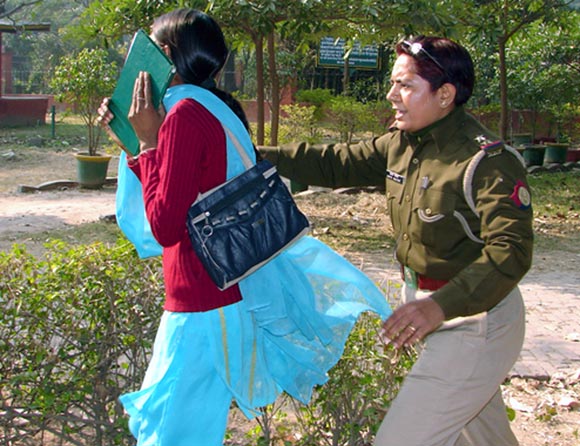
Dacoits, rapists, murderers or lovers -- who should be considered top priority when it comes to the law?
For the Meerut police, the answer was quite simple. In 2005 the city police went after couples sitting in parks, roughing up the boys and making them do sit-ups and filming their humiliation. This was the punishment dealt out for being spotted with their girlfriends.
This rather ironically named 'Operation Majnu' campaign saw the police harassing young couples in a drive against obscenity.
The police didn't even spare young women -- a 25-year-old was taking a walk in a park with her brother when a policewoman set upon her and began beating her up.
She was among many girls who were dragged to the police station, had their parents summoned and let off after a warning.
In spite of the adverse reaction it received -- Meerut Deputy Inspector General of police Raj Kumar Vishwakarma admitted that the police were using extreme and excessive measures and officer suspensions soon followed -- it wasn't the last one heard of Operation Majnu-style incidents.
There were similar drives in Muzaffarnagar and Aligarh, also in Uttar Pradesh, which also received flak. But none of the adverse reactions prevented Alka Pandey, a local police officer in Ghaziabad, near New Delhi, from taking up the noble cause of 'stop(ping) innocent girls (from) being trapped by boys with evil motives'.
And so in November 2011, rather than fighting hardened criminals, Pandey set out with her men and camerapersons to humiliate couples sitting around in parks and public places across the city.
Needless to say, Pandey achieved little besides a few TRP points for the news channels that aired the footage. In fact, she was suspended on charges of harassment.
Please move on to the next slide and register your vote on the last page of this slide show.
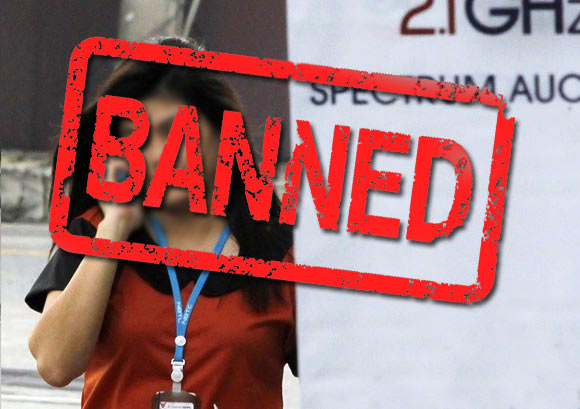
Long before BSP MP Rajpal Singh Saini rinsed his mouth with his foot by suggesting that mobile phones in the hands of young women can only invite trouble, came the members of the Punjab State Commission for Women.
In 2011, this statutory body of the Punjab government, whose primary task is to safeguard the interests of women, issued a list of do's and don'ts to keep marriages from breaking up.
The secret formula for a successful and smooth marriage, according to the commission members, was that wives should either limit their phone conversations or totally give them up, at least during the first few months of their marriage!
This genius of an advisory was issued in the form of a brochure and suggested that young brides must be 'very adjustable', since mobile phones tend to break many alliances in Punjab as long conversations only makes husbands and in-laws suspicious.
What's more, the brochure also suggested that a marriage took nearly two years to be successful, though how the commission arrived at this time-line remains a mystery.
Please move on to the next slide and register your vote on the last page of this slide show.

Up next is a village panchayat that will probably make Rajpal Singh Saini and the Punjab State Commission for Women look like radical feminists.
The Baghpat Panchayat in Uttar Pradesh decided in July that love marriages are a bad idea, as are women shopping and talking on mobile phones.
So what did the village elders do?
They banned love marriages and prohibited women below 40 years of age from going out shopping and using mobile phones.
And if by any chance they wished to step outside their homes, the elders said, women must have their heads covered.
These bizarre diktats were issued during a panchayat meeting on July 11.
While the National Commission for Women was fuming, residents of the village claimed that the panchayat had simply issued the directives after members of several communities living in the village came to a consensus on the issue.
Please move on to the next slide and register your vote on the last page of this slide show.
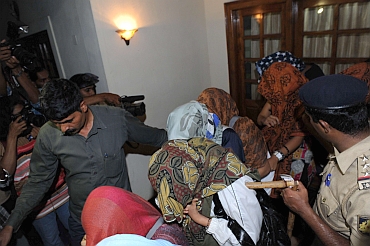
Back to Mangalore. In July, nearly three-and-a-half years after the shameful pub attack by the Sri Ram Sene, a group of men belonging to another Hindu fundamentalist group barged into a homestay on the outskirts of the city, where a young man was celebrating his birthday with friends.
Nearly 40 male representatives of this self-appointed moral brigade which, by some accounts, was a faction of the Hindu Jagran Vedike, entered the party and demanded that it be stopped immediately.
Much like the other vigilante groups, this one too carried cameras and filmed parts of the 'raid' on what they claimed was a rave party.
According to various eyewitnesses, as well as footage aired on various television channels, the activists manhandled the girls and assaulted the boys.
The activists claimed the girls were dressed 'indecently' and were indulging in activities which were not 'correct'.
Even as the Kankanady police, under whose jurisdiction the area falls, succeeded in arresting a couple of activists, Subhash, a member of the Vedike, said they would not allow such parties to take place.
'It is demeaning and such illegal activities should be stopped at any cost. It is against our culture and community,' he told Rediff.com at the time.
Matters got complicated as the homestay didn't have a commercial license to do business. And intriguingly, even though the police said that no traces of drugs or any illegal material were found at the party venue, the Karnataka State Commission for Women kept insisting otherwise.
Please move on to the next slide and register your vote on the last page of this slide show.
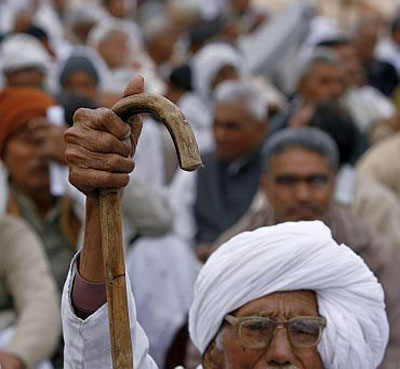
As if finding a suitable bride or groom isn't difficult enough as it is, members of khap panchayats (community councils) from across Uttar Pradesh, Haryana and Rajasthan thought it might be a good idea to throw in a few more hurdles along the way.
You know, just to make sure you labour enough to enjoy the fruit.
In November 2010, at a Sarv Khap Jat Mahapanchayat meeting held in Muzaffarnagar, Uttar Pradesh, these leaders demanded an amendment to the Hindu Marriage Act to ban marriages within the same gotra.
'Go...what?' you ask. In Hindu society, the term 'gotra' refers to descendants in an unbroken male line that can be traced back to one of the eight sages -- Vishvamitra, Jamadagni, Bharadvaja, Gautama, Atri, Vashista, Kashyapa and Agasthya.
And marriages within the same gotra -- sagotra marriages -- are not permitted, according to the traditional marriage system, since they are, in a broad sense of the term, siblings.
Since the law of the land does not permit such a system, the gotra system has gone on to become a major bone of contention between the khaps and the government.
The issue of same-gotra marriages has been at the heart of a number of crimes, including honour killings as in the much publicised Manoj-Babli case of 2007, in which two newlyweds from the same gotra were abducted and killed by the bride's relatives to save their family honour.
In a landmark judgment in March 2010, a Karnal district court sentenced five of the perpetrators to death, the Khap head who ordered the killings to a life term and the driver involved in the couple's abduction to a seven-year term in prison.
Please move on to the next slide and register your vote on the last page of this slide show.

Continuing with the khaps and closer to the present, we come to Jitender Chhatar, a khap panchayat leader who shot to national fame last fortnight.
Chhatar's 'Chowmein' quote has been published in practically every publication you may name, but is still perhaps worth reproducing once again for its sheer ridiculousness.
'To my understanding, consumption of fast food contributes to such incidents (as rape). Chowmein leads to hormonal imbalance evoking an urge to indulge in such acts,' Mr Chhatar said, adding, 'You also know the impact of Chowmein, which is a spicy food, on our body. Hence, our elders also advised to consume light and nutritious food.'
It's the kind of stuff you think you'd hear on Kids Say the Darndest Things and laugh your guts out -- except that it's not.
Chhatar was in all seriousness defending the khaps' demand to lower the legal marriageable age of girls from 18 years to 16 since (hold your breath) young girls are vulnerable to rape and hence should be married off earlier.
Please move on to the next slide and register your vote on the last page of this slide show.
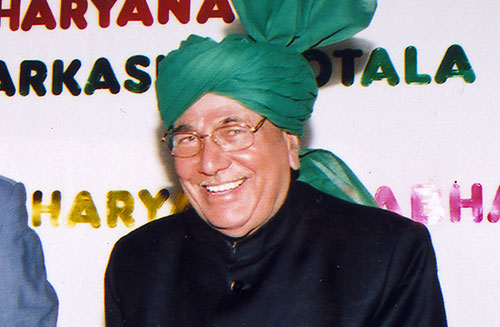
Jatinder Chhatar did have one supporter -- well, for a short time, anyway.
Regarding the lowering of legal marriageable age, Haryana's Leader of the Opposition Om Parkash Chautala said and we quote: 'We should learn from the past...specially in the Mughal era, people used to marry their girls to save them from Mughal atrocities and currently a similar situation is arising in the state. I think that's the reason the khap has taken such a decision and I support it.'
Of course, the statement caused a furore and Chautala backpedalled for all he was worth, saying, 'If some khap or individual has made a suggestion about a girl's marriageable age, then it is up to the government to accept it or not. Anybody can give suggestion... but the media assumed my support to it (the khap panchayat's suggestion). But I want to say that we neither supported it, nor we made such a demand or suggestion.'
Thank you, Mr Chautala, for the entertainment and the eloquence with which your statements are always delivered.
Please move on to the next slide and register your vote on the last page of this slide show.

Next we have the one and only BSP MP, Rajpal Singh Saini, the man of the moment.
At a meeting in Muzaffarnagar, Uttar Pradesh in October, he stated that woman and children, particularly girls, should not be given mobile phones because they 'only invite trouble'.
He claimed that the women in his life -- his mother, wife, sister and daughter -- never use a cell phone and were doing quite well without one.
Instead of stopping there, Saini went on to say that it was alright for men to let women and children use their mobile phones, but overall it was a bad idea to let them own one.
Unsurprisingly, BSP supremo Mayawati was said to be annoyed with Saini's remarks and so he did what all politicians and actors seem to do when in trouble -- blamed the media for misquoting him.
A word of advice, Sainiji -- watch what you say about women, particularly if your boss happens to be one!
Please move on to the next slide and register your vote on the last page of this slide show.
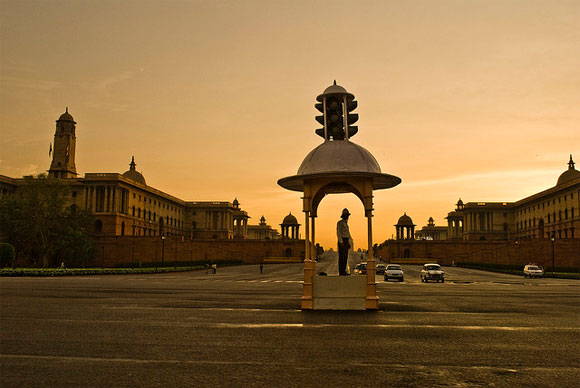
With so many of its netas and babus making ridiculous blunders, can the Government of India be far behind?
In February, the Centre disapproved the decriminalisation of gay sex, calling it highly immoral.
P P Malhotra, the additional solicitor general, who was appearing for the home ministry, argued that gay sex was against the social order and that Indian society should not imitate the practices prevailing in foreign countries.
It is not a matter of astonishment that as word got out in the media, the ministry quickly distanced itself from Malhotra's assertions, saying that it hadn't taken any stand on the Delhi high court's landmark order that decriminalised homosexuality.
Now, please register your vote on the next page.
So who do you think is the worst offender against India's youth?
Take the poll below and let us know!